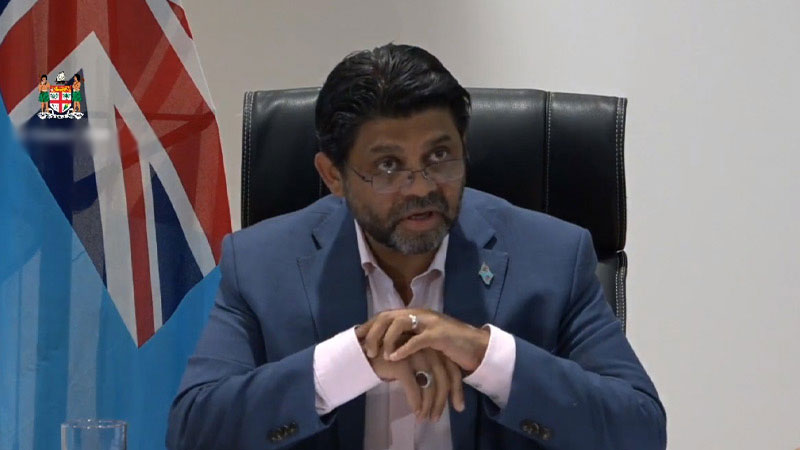The task that the Fiji government has faced since the onset of the COVID-19 crisis has been challenging, involving difficult choices and adjustments. Despite rising case numbers and deaths, there is an obvious tension between protecting health in the short term and keeping non-essential businesses closed for a prolonged period. The government has opted for a softer lockdown – a relaxation of suppression strategies forcing health authorities to fall back to mitigation.
As at 19 July 2021, there were 14,247 active COVID-19 cases – from a total of 18,298 positive cases since the first case was reported in March 2020. There have been 113 deaths from COVID-19, with 111 of these during the second wave of outbreak that started in April this year. The seven-day average daily test positivity was 26% on 19 July and has continued to rise.*
The 2021-2022 budget, delivered on 16 July against this backdrop of rising COVID-19 infections, is the third national budget by the government since April 2020. The budget is based on a total revenue forecast of F$2.08 billion and an expenditure commitment of F$3.69 billion. After borrowing to finance the shortfall of F$1.6 billion and debt repayment of F$367.8 million, government debt stock is estimated to reach around F$9 billion by July 2022. This would equate to almost 92% of GDP. Total debt servicing (interest plus principal payments) for 2021-2022 will be F$757.8 million or 36% of total revenue or 20% of total expenditure. As expected, the debt burden continues to be exacerbated.
On the expenditure front, the budget has a strong focus on social protection – this is appropriate and necessary since the government’s response to households so far has been inadequate given the magnitude and duration of the economic impact of COVID-19. In addition to the regular budgetary provision for the Social Pension Scheme and Poverty Benefit Scheme, existing water and electricity subsidy quotas have been increased.
F$200 million has been allocated as unemployment support for workers from formal and informal sectors. However, the conditions attached to the unemployment support payment raises questions about the intention and expected impact of the scheme on vulnerable households. First, the government has extended its controversial ‘no jab no job’ policy to ‘no jab no unemployment support’. This approach is neither inclusive nor considerate. It is coercive and biased – why should children in poor households be deprived if parents choose not to take the vaccination? Second, formal sector unemployed workers who have sufficient funds in their Fiji National Provident Fund (FNPF) ‘general account’ don’t qualify. Why should unemployed workers who have sufficient funds in their retirement fund be left out of the government funded unemployment support? Tools such as unemployment benefits are not only about macroeconomic stabilisation to stimulate an ailing economy but also about mitigating the impact of the crisis on vulnerable households. Excluding households based on conditionality will not help.
Nonetheless, unemployment support should continue beyond January 2022 and up until the economy reaches pre COVID-19 real GDP. This is because employment is expected to recover more slowly than production after a downturn and social protection will be required to support households.
On the revenue side of the budget, the total forecast hinges on the expected sale of government assets (F$150 million), receiving foreign aid in cash, and economic activity driven by tourism (with borders reopening in the first half of 2022 – and with this the assumption of at least 150,000 arrivals). In the 2020-2021 budget, the government received around F$250 million aid in cash towards budget support from Australia, New Zealand and other development partners. This accounted for almost 12% of total government revenue and played an important part in reducing the net deficit for 2020-2021.
The risks from the pandemic remain high, adding to the uncertainty of economic recovery in 2022. Apart from government spending, personal remittances – which are expected to surpass F$700 million in 2021 – should play a key role in boosting consumer domestic demand and economic activity.
The ultimate impact of the budget depends on the realisation of expected incomes and adherence to meeting expenditure commitments. If incomes are not fully realised, continuation of expenditure commitments will depend on the government’s ability to access additional financing (and aid in cash). Otherwise, there will be a need to reorganise and retract expenditure commitments – especially if domestic economic conditions worsen as COVID-19 infections continue to rise.
If the current measures to contain and mitigate the spread of the disease do not lead to reduced infection and contagion, there would be a need for a revised budget sooner than later. Beyond the budget, and more consequential, will be the deaths and illness from COVID-19 as well as the collateral damage to our families due to a protracted delay in eliminating the virus from the community.
Given the current fiscal path, even as the worse effects of the pandemic recede, fiscal challenges will remain significant. The path towards short- to medium-term recovery will depend on more than just domestic policies and external environment – work will be needed to rebuild business, investor and political confidence.
*These figures have since been updated. As at 21July 2021, there were 15,686 active COVID-19 cases – from a total of 20,443 positive cases since the first case was reported in March 2020. There have been 146 deaths from COVID-19, with 144 of these during the second wave of outbreak that started in April this year. The seven-day average daily test positivity was 27.5% on 21 July.
This article appeared first on Devpolicy Blog (devpolicy.org), from the Development Policy Centre at The Australian National University.
Neelesh Gounder is Senior Lecturer in economics and Deputy Head of School (Research), School of Accounting Finance and Economics at the University of the South Pacific, Suva. He is also a Centre Associate with the Development Policy Centre.
